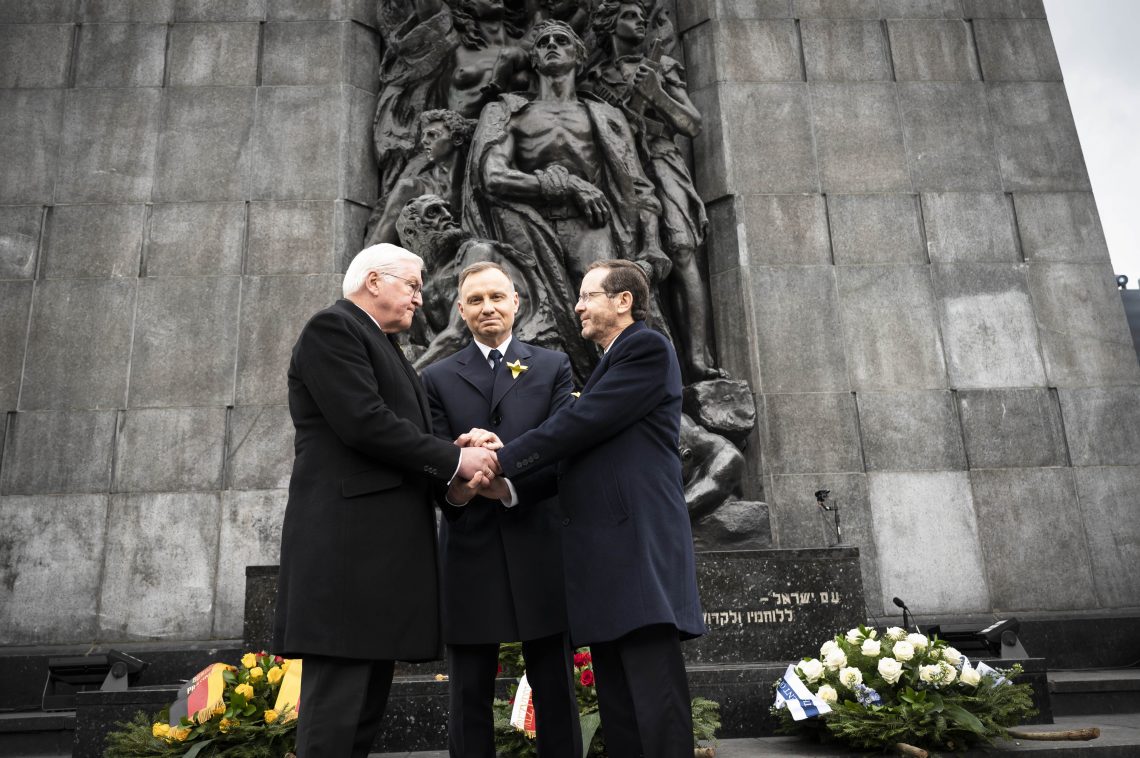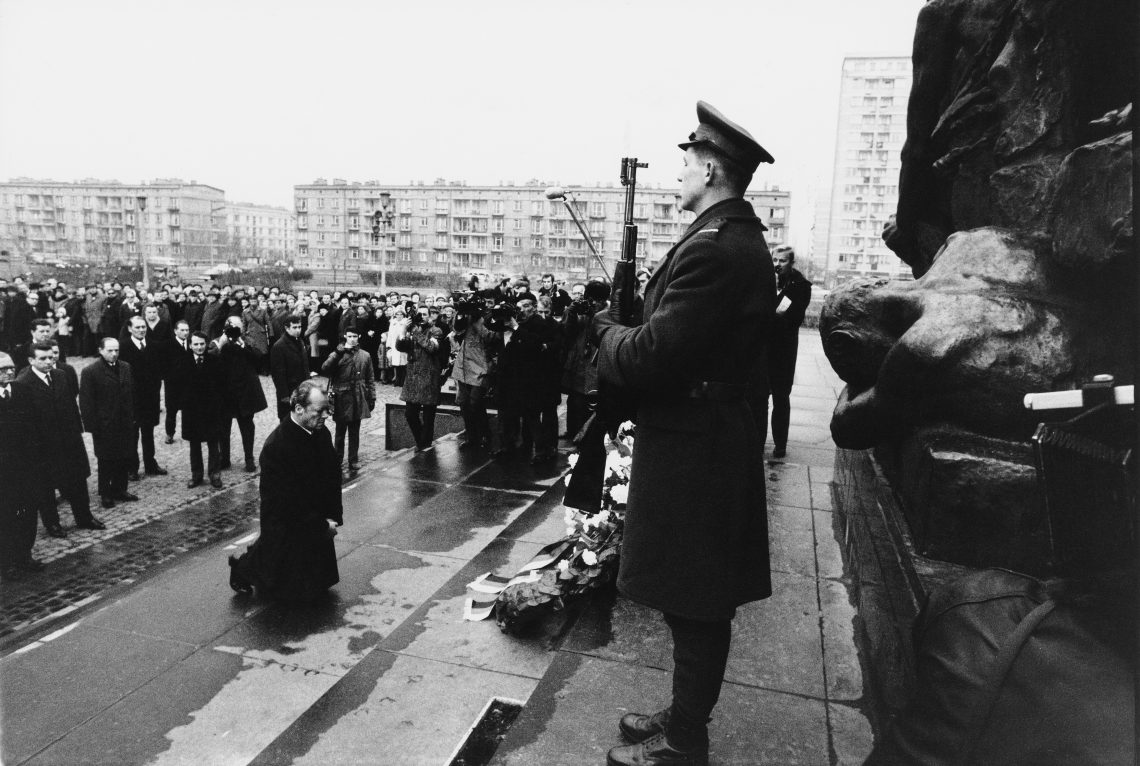Breaking the German-Polish deadlock
The strained relationship between Germany and Poland is becoming a problem for the European Union and NATO. Warsaw can be a frustrating partner but Berlin can show leadership and break the impasse.

In a nutshell
- The German-Polish relationship, despite its strengths, is in poor shape
- This has negative consequences for NATO and European security
- If Germany took steps to repair ties, Europe would be better for it
The relationship between the Polish and German governments has been sour despite many positives. Some say the relationship is at its worst since 1989. Both sides praise their economic relationship, which is booming, and people-to-people ties, which are vast and vibrant. Poland will reportedly replace France as Germany’s fourth-largest trading partner soon.
German leaders regularly emphasize their special responsibility toward Poland for the crimes of the Nazi regime. German President Frank-Walter Steinmeier most recently voiced the point during his April 2023 visit to Poland for the 80th anniversary of the Warsaw Ghetto Uprising. The Germans acknowledge they owe unification in part to the Polish trade union Solidarity’s role in the collapse of the Soviet Union and the Warsaw Pact. Politicians from both countries meet regularly at senior levels, say positive things about each other, and cooperate on a wide array of issues.
Germany and Poland need to work better together to meet growing geopolitical challenges.
Berlin and Warsaw, however, are on very different political wavelengths, and their politicians do not trust each other. Both sides regularly express significant differences publicly and privately, pursue different goals on issues that matter greatly to the other side and snipe at or speak ill of each other. That negatively affects transatlantic priorities and makes Europe weaker at a time when Germany and Poland need to work better together to meet growing geopolitical challenges.
Germany on Poland
The reasons for this state of affairs are well-known and widely understood. Berlin considers Poland’s Law and Justice-led (PiS) government too conservative, too populist, too focused on sovereignty and Washington at the expense of Brussels and the European Union, and too hostile toward Russia. From Germany’s standpoint, Warsaw is preoccupied with the dark chapters of their shared history (including the partition of Poland by Prussia and two other neighbors in the late 18th century and the genocidal Nazi occupation in 1939-1945) and not enough on the future.
German elites tend to view PiS leaders as “complicated” at best but more often antagonistic toward their country and as foreign policy novices. They refer to PiS leader Jaroslaw Kaczynski in not particularly favorable terms and consider his party full of “the losers of the transformation,” “illiberal populists” and Europe’s “problem children.” Berlin resents being the punching bag for PiS politicians and clearly prefers the opposition Civic Platform (PO) led by Donald Tusk, the former Polish prime minister and EU Council president, even as it respects Polish voters’ decisions.
Warsaw’s demand for 1.3 trillion euros in reparations for the Nazi occupation, put forth on September 1, 2022, the 83rd anniversary of the Nazi attack on Poland, added a major problem to the relationship. Berlin has long signaled it will not entertain a reparations request, and considers the sum outrageous.

Many German politicians call the reparations campaign a political stunt by PiS to play to its base and increase its chances of success in the parliamentary elections. While there is no doubt an element of domestic politics to the PiS reparations demand, many Poles also believe Germany has prioritized other victim groups and that they have come up short.
Many Germans consider it galling or worse that the Polish government continues to raise the issue. German experts go to great lengths to reiterate their permanent responsibility for Nazi crimes but stress that Warsaw’s demand – presented 77 years after the end of World War II, 33 years after the fall of the Berlin Wall, and 18 years after Poland joined the EU – had been resolved in 1953.
At the time, Communist Poland declared (under Moscow’s pressure) that it would not pursue reparations. That was confirmed in 1970 by Poland’s deputy foreign minister, yet again in the 1990 Treaty on the Final Settlement with Respect to Germany (also known as the Two Plus Four Agreement that paved the way for German reunification), and further in 2017 by the then deputy foreign minister who is now Poland’s ambassador in Washington.
Polish opposition parties generally accept Berlin’s view of the issue, say it would open a Pandora’s box, and message that PiS has resuscitated the matter solely for domestic political reasons. However, a September 14, 2022, vote in the Sejm (Poland’s parliament) stating that the Polish state has never renounced its claims and calling on Germany to assume financial responsibility for the war passed 418 to 4, with 15 abstentions and 23 not taking part in the vote. Even if there was a domestic political aspect to that vote, as the opposition argues, itrevealed support from an overwhelming number of their MPs.
Poland on Germany
The PiS-led government views Berlin with suspicion, believing successive German governments prioritized its own economy over security and pursued close relations with Russia at the expense of treaty allies. Warsaw also takes issue with Berlin pressing what PiS leaders perceive as progressive social engineering at the EU level, a naive or corrupt energy policy and a hypocritical stand on issues like the rule of law and media freedom.
Read more on Central European Perspectives
Why Hungary and Poland are sticking together
For many Poles, it will take a long time for Berlin to live down its decision to build the Nord Stream 2 pipeline after Russia annexed Crimea in 2014 and occupied parts of eastern Ukraine (for which the EU imposed some sanctions), even if they concede Germany finally did the right thing and halted the project two days before Russia’s renewed and full-scale invasion of Ukraine in February 2022.
PiS leaders view Berlin as totally wrong on some of the most important foreign and security issues of the 21st century.
The two countries’ approaches to the Kremlin and Russia’s war against Ukraine are seriously divergent and complicate the bilateral relationship further. Opposition politicians like former Foreign Minister Radek Sikorski say Berlin fails to display leadership on Ukraine and responds tardily only after strong outside pressure. Warsaw’s preference for a different EU – more a federation of sovereign nation-states than a superstate – clashes with official Berlin’s preference for a strong Brussels, “more Europe” or an “ever deeper Union.”
Other Polish attitudes toward Germany can be intensely personal. PiS leaders, and many Poles to varying degrees, view Berlin as ambivalent, condescending, patronizing, arrogant, overbearing, selfish, morally corrupt, captive to its own economic interests and totally wrong on some of the most important foreign and security issues of the 21st century. These include relations with Russia, energy security and economic dependence on dictatorships.
Some PiS leaders believe Berlin’s long-standing appeasement policy vis-a-vis Russian President Vladimir Putin contributed significantly to Russia’s invasions of Ukraine and Georgia, even if Moscow bears full responsibility for launching them, and to aiding and abetting frozen conflicts in the post-Soviet space.
Underpinning such perceptions is what one may characterize as lingering national trauma for the damage Nazi Germany wrought on Poland in World War II.
Berlin: The ball is in Warsaw’s court
For German policymakers, the ball is in Poland’s court to fix this state of affairs. Warsaw should act, or “make nice with Germany,” as a former German ambassador to Poland recently put it, and stop “Germany bashing,” which ranges from gratuitous anti-German comments in the media and crude Nazi references to remarks that paint Berlin as almost an enemy. German Poland watchers remember and take serious offense that Mr. Kaczynski used the term “Fourth Reich” to refer to Berlin’s goals for the EU.
Read more on Germany’s transformative policies
Focus Germany: Balancing the Energiewende
In this view, the burden is also on Warsaw to fix its relationship with the EU by at least modifying its judicial system according to EU standards, if not supporting the expansive EU agenda. Germans argue that Berlin deserves credit for making dramatic changes to its Russia policy by dropping Ostpolitik and providing significant assistance to Ukraine. Warsaw ought to recognize that the Zeitenwende transformation is real, the German side insists, and move to rebuild ties. Polish opposition politicians usually agree or sympathize with these views. They consider PiS the primary cause of the strained relationship and express that message to the outside world.
Warsaw: Berlin must take the first step
In contrast, the Polish government expects Berlin to take the first step toward restoring the relationship. When Polish Foreign Minister Zbigniew Rau recently presented his 2023 foreign policy priorities in April, he said it was “Warsaw’s duty to strive to give Polish-German relations a shape that could be described as a model.” However, he also mentioned two steps Berlin could take to improve the atmosphere, not only with Warsaw but with other eastern flank NATO allies that have become less trustful of Berlin in recent years.
Foreign Minister Rau’s main request seemed to be that Germany give Poland’s security higher priority in its foreign policy and show a greater understanding of Polish interests. He suggested Berlin change its position on the NATO-Russia Founding Act, which restricted the deployment of “significant military forces” in the new NATO member states, a line which Berlin insisted needed to be toed.
The Polish foreign minister also expected Germany to deprioritize Russia in its foreign policy by “taking an equal approach to all World War II victims and the damage caused, regardless of religion, nationality, origin and citizenship.” Mr. Rau said Germany has no less debt toward Poland (or Ukrainians, for that matter) than toward Russians, a debt that remains outstanding and “dramatically strains mutual relations.”
Neither Germany nor Poland appears willing to budge on some of the most important grievances with each other.
Foreign Minister Rau insisted Poland “will also work to convince our German partners that settling the problem of German compensation to Poland and Poles is not only in our mutual interest, but also in the universal interest of the international community.” Poland’s goal is to create an international system “in which starting wars will be unprofitable, with the aggressor knowing that they must always pay the price of compensation for the moral and material damages they inflicted. This is what we are going to enforce on Russia with respect to Ukraine. The same is necessary in relations between Germany and Poland,” the Polish minister stated.
Facts & figures
How Berlin and Warsaw can get out of the fix
Berlin and Warsaw both seem convinced the other should take the first step to change its approach before ties can improve. Neither Germany nor Poland appears willing to budge on some of the most important grievances with each other.
Both sides will need to take steps towards the other. As the larger and more powerful country, however, and the side that has, over time, inflicted far greater harm on the other, Germany could begin breaking the stalemate. How?
Short-term: Germany extends its extensive and genuine “remembrance culture” or “Erinnerungskultur” to include its historic responsibility to Poland and other Nazi victims. Berlin could do more to acknowledge lingering Polish national trauma, for example, by implementing the Bundestag’s 2020 decision to establish a memorial to Polish victims of World War II in central Berlin “to fill a gap in German collective memory,” as former Bundestag President Wolfgang Thierse put it.
Short-term: Berlin should show greater public sensitivity to Poland’s security interests, which would address one of Foreign Minister Rau’s key points. Given the power imbalance, German leaders may have difficulty treating their PiS counterparts as equals, or “auf Augenhoehe” (“at eye level”) and accepting the idea that power and influence in Europe are shifting east and north. Poland is the most important NATO and EU member state in Central and Eastern Europe. The bilateral relationship suffers from an “asymmetry of attention,” as a senior German diplomat described it, and merits more care, even if PiS can sometimes be a difficult partner. Berlin could also revitalize the Weimar Triangle and upgrade its approach to Poland so the bilateral relationships are closer to the same level. After Russia’s full-scale invasion of Ukraine, Germany has a unique opportunity to break with unsuccessful past policies and show genuine leadership. That could include taking the initiative to turn over a new leaf with Warsaw.
Longer-term: Germany has made payments to Poland over the years, including in 1972, 1975, and 1990 and especially to Polish-Jewish victims of the Holocaust, for whom Germany has expressed permanent historic responsibility. Polish politicians say Warsaw received some 15 percent of German reparations payments, suggesting that is as much as can be expected. Beginning in the early 2000s, the German industry also compensated Polish slave and forced laborers. Poland does not often mention these transfers, instead focusing on what it considers to be an outstanding balance. However, many payments have taken place, even if they total far less than the damage and suffering Nazi Germany wrought on Poland and probably less than Germany has paid other World War II victims. Restarting such payments would be a much heavier lift, but Germany makes payments not necessarily required by treaty or agreement to Holocaust victims simply because it is the right thing to do. Berlin should consider including Polish World War II victims in this practice.
Warsaw should also contribute to breaking the deadlock.
Short-term: PiS should tone down its rhetoric, even if it may play well with its base in an election year. Public pressure from Poland on Berlin will likely backfire, regardless of how deeply-held Polish views may be. PiS should accept this reality and make clear to its party leaders that gratuitous anti-German commentary is unhelpful, counterproductive and threatens to poison the bilateral relationship further. PiS should also keep in mind that Thomas Bagger, the German ambassador in Warsaw, will soon transfer to one of the most senior positions in the German Foreign Ministry. PiS should think of him as someone who can help with the bilateral agenda. Rhetoric that unnecessarily picks fights can alienate a knowledgeable potential advocate for a more constructive relationship.
Scenarios
It is unrealistic to expect Berlin to execute a spectacular gesture like former Chancellor Willy Brandt’s 1970 kneeling in Warsaw that did so much for German-Polish reconciliation or to fulfill Polish expectations on reparations anytime soon, if ever. Foreign Minister Rau, however, does not seem to have made reparations the sine qua non to an improved relationship. Berlin can relatively quickly pay more attention to Central and Eastern European interests if it has genuinely jettisoned Ostpolitik and intends to execute the Zeitenwende fully.
The most perceptive German leaders, who acknowledge that Berlin has lost stature with its treaty allies on the Eastern Flank of NATO and seek to fix this, remain in the minority. Berlin should also listen closely to MP and Coordinator for German-Polish Intersocietal and Cross-Border Cooperation Dietmar Nietan, who has a sophisticated understanding of the bilateral relationship and can play a positive role in improving it.
Further reparations are anathema in Berlin, which is unlikely to accept that framework. However, payments or other forms of compensation not labeled “reparations” for the massive Polish losses may be less of a lightning rod, even if the full 1.3 trillion euros is unlikely. Berlin will not wish to give an electoral boost to PiS or be seen as caving in to the party, but Germany’s stock in Poland would rise and its bilateral relationship would improve if Berlin takes the lead to find ways out of today’s stalemate.
Berlin is probably most inclined to wait until the fall elections and hopes for an opposition victory, as this would return the bilateral relationship to a positive trajectory. However, that does nothing to address the root causes, which also Polish opposition politicians concede remain issues, even if they do not press them. Polish frustration with Berlin’s approach to the Zeitenwende spans all parties and waiting for a change in government for the relationship to improve is a risky proposition for Berlin.
This approach would also fail if PiS, which remains ahead in the polls, despite improving Civic Platform popularity in recent months, prevails in the fall and forms a government. Berlin will probably decide that any unilateral steps it were to take in Warsaw’s direction would strengthen PiS against the opposition and decide against it. In that case, the bilateral relationship will remain “correct,” but German and Europe’s interests in CEE will suffer.










